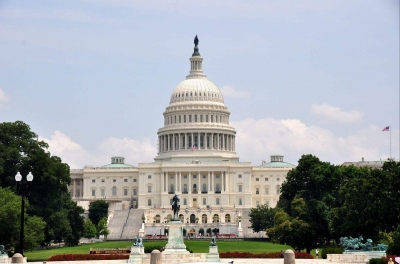The U.S. Senate has approved by an overwhelming majority the legislation to provide a staggering $190 billion package to beef up the country's ability to compete with Chinese technology.
The bill authorises the largest ever funding in American history for technology research, semiconductor development and manufacturing, as well as subsidies for robot makers and chipmakers. The computer chip shortage has hit automobile production in major US companies such as GM at a time when global demand is reviving.
U.S. Commerce Secretary Gina Raimondo has said the funding is on a scale that could enable the setting up of as many as seven to 10 new U.S. semiconductor plants.
Also read: US blacklists another 58 big Chinese companies with military links
The desire for a tough line on China saw a deeply divided U.S. Congress, which is narrowly controlled by President Joe Biden's fellow Democrats, joining hands to approve the Bill with a 68:32 majority.
The bill must now be cleared by the House of Representatives before it is sent to the White House for Joe Biden to sign into law.
The bill has a number of other China-related provisions including prohibiting the social media app TikTok from being downloaded on government devices, and would block the purchase of drones manufactured and sold by companies backed by the Chinese government.
It would also create broad new mandatory sanctions on Chinese entities engaged in U.S. cyberattacks or theft of U.S. intellectual property from U.S. firms, and provides for a review of export controls on items that could be used to support human rights abuses.
Also read: Biden backs Trump-era hard line to ban China’s tech giants
Many U.S. companies praised the bill. General Motors Co said the legislation "represents an important step to address the semiconductor shortage that continues to impact U.S. automotive manufacturing."
The bill also incorporates diplomatic steps to counter Beijing’s growing global influence through, by working with allies and increasing U.S. involvement in international organizations which represents a change from erstwhile President Donald Trump's "America First"policy.
"I believe that this legislation will enable the United States to out-innovate, out-produce, and out-compete the world in the industries of the future," BBC cited Senate majority leader and co-sponsor of the bill Chuck Schumer as saying on the Senate floor.
"If we do nothing, our days as the dominant superpower may be ending. We don’t mean to let those days end on our watch. We don’t mean to see America become a middling nation in this century," Schumer said.
President Biden praised the passage of the bill. "It is long past time that we invest in American workers and American innovation," he said in a statement.
"We are in a competition to win the 21st century, and the starting gun has gone off. As other countries continue to invest in their own research and development, we cannot risk falling behind."
Angry China criticises move
An angry China responded to the vote by saying it objected to being cast as an "imaginary" U.S. enemy.
China's parliament said in a statement that the U.S. bill showed "paranoid delusion of wanting to be the only winner" and had distorted the original spirit of innovation and competition.
Chinese foreign ministry spokesman Wang Wenbin the bill "full of Cold War and zero-sum thinking and runs counter to the public aspiration in both countries to strengthen exchanges and cooperation".
"The China-related content of the bill passed by the US Senatedistorts facts and slanders China's development path and its domestic and foreign policies," he said. "It exaggerates the 'China threat', advocates traditional competition with China and seriously interferes with China's internal affairs on Taiwan."




















